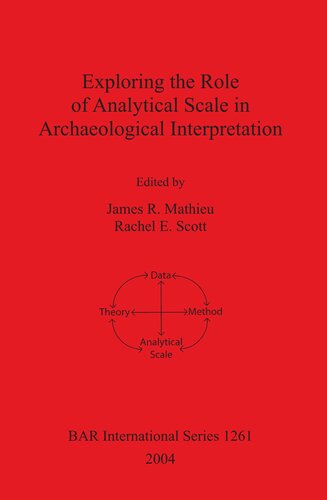

Most ebook files are in PDF format, so you can easily read them using various software such as Foxit Reader or directly on the Google Chrome browser.
Some ebook files are released by publishers in other formats such as .awz, .mobi, .epub, .fb2, etc. You may need to install specific software to read these formats on mobile/PC, such as Calibre.
Please read the tutorial at this link: https://ebookbell.com/faq
We offer FREE conversion to the popular formats you request; however, this may take some time. Therefore, right after payment, please email us, and we will try to provide the service as quickly as possible.
For some exceptional file formats or broken links (if any), please refrain from opening any disputes. Instead, email us first, and we will try to assist within a maximum of 6 hours.
EbookBell Team

4.0
76 reviewsThis book grew out of a symposium session entitled "Continuity and Change: The Role of Analytical Scale in European Archaeology" for the Society for American Archaeology Annual Meetings in Philadelphia, Pennsylvania in April 2000. The basic premise behind this work is that the scale at which we pursue our research, the analytical scale, effects our interpretations of the archaeological record. The purpose of this volume is to encourage an explicit discussion of this relationship in order to develop a clearer understanding of its impact on research. This is done by highlighting some aspects of the role played by analytical scale in the analysis and interpretation of the archaeology of Europe. The papers include: Exploring the Role of Analytical Scale in Archaeological Interpretation (James R. Mathieu and Rachel E. Scott); Scale Factors in Early European Farming (Peter Bogucki); Analytical Scale, Populations, and the Mesolithic-Neolithic Transition in the Far North-west of Europe (Timothy Darvill); Scale and its Discontents (D. Blair Gibson); The Four Scales of Technical Analysis; or, How to Make Archaeometry More Useful (Elizabeth Hamilton); Faces in a Crowd or a Crowd of Faces? Archaeological Evidence for Individual and Group Identity in Early Anglo-Saxon East Anglia (Genevieve Fisher); The City and Complexity: Change and Continuity in Late Antique Volterra (Rae Ostman); Distinguishing the Local from the Regional: Irish Perspectives on Urbanization in Early Medieval Europe (John Soderberg); Patterns in Time and the Tempo of Change: A North Atlantic Perspective on the Evolution of Complex Societies (Kevin P. Smith).